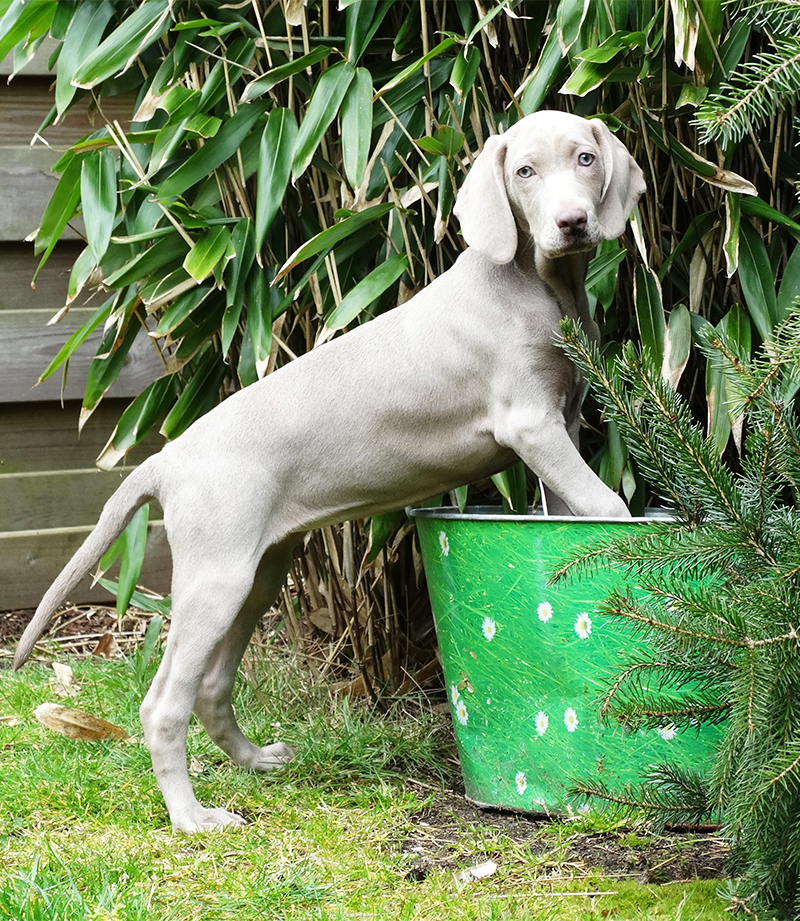
I have been breeding, raising and training Weimaraner dogs for over a decade. They have it all, a unique look with a wonderful albeit sometimes challenging personality. As an experienced dog trainer I find them great fun to work with. If you follow positive reinforcement methods and learn to bond with your dog as they grow, this is a breed that has the potential to be an amazing family pet as well as working companion.
These beautiful silver coated dogs are intelligent, fun and full of charisma. But they can also suffer from separation anxiety, and have high exercise needs. So let’s find out if this is the right breed for you!
Contents
The Weimaraner is a medium to large silver grey purebred dog. This breed is loving, energetic, and intelligent. They weigh 55 – 90 pounds, and will measure up to 27 inches when fully grown. Today I’ll share where this gorgeous silver dog comes from, and what they need in the way of exercise and training. I’ll explore coat color, and long haired Weimaraners, discuss rescue options, and share some beautiful pictures with you too
Where Do Weimaraners Come From?
Weimaraners are a large breed of sporting dog. Referred to as ‘versatile’ gun dogs in the USA and Hunt Point Retrievers in the UK, they make excellent hunting companions if chosen from working lines.
They are called ‘Weimaraners’ because they are said to originate from Weimar, Germany. The recorded history of the Weimaraner dog dates back to 1897, when a club was first formed for the breed in Germany. There are reliable records available from that date forwards. However, the history earlier than 1897, is best described as murky and mythical hearsay.

It’s safe to say that we don’t really know much at all about pre-1897. And that any sources purporting to know are using unreliable information. Interestingly, what we do know is that, from 1897 to 1922, Weimaraners were listed in the German Shorthaired Pointer (GSP) stud book and did not have their own registry.
Breed supporters had to fight hard to see the dog recognized as a separate breed. Not just a grey version of the GSP (Koshyk 2011). In terms of recent past, then, we can see that the Weimaraner is most closely related to the GSP.
Weimaraner Appearance
Weimaraners really are stunning dogs, who draw looks of appreciation wherever they go. Traditionally, this is a docked breed but undocked dogs are also now commonly seen especially as pets.
On average, male Weimaraner average weight will be greater than females. Female Weimaraners range from 55-77lbs (25-35kg) and are 56-64cm (22-25in) tall. Male Weimaraners range from 66-88lbs (30-40kg) and are 61-69cm (24-27in).
These dogs have deep chests and considerable ‘tuck-ups’ after the rib-cage. They should look very athletic.
Is My Weimaraner Too Thin?
Sometimes people have, in their minds, the body-shape of a show-bred labrador and try to feed up their Weimaraners to achieve this. This is not what the body-type of a Weimaraner should look like. A Weimaraner dog with that body-shape would be very overweight.
Adolescent Weimaraners, especially males, will often go through a ‘skinny’ phase when it seems hard to keep weight on them – but they will emerge from this. So try not to worry if your adolescent Weimaraner is skinny!
Weimaraner Coat Types
Their most distinctive feature is probably their striking silver-grey coat. Interestingly, this appearance is achieved through very tight interspersing of white and brown hairs – not from a coat which is actually silver.
The short-haired Weimaraner is the most common type – with a coat similar to the German Shorthaired Pointer coat. This needs very little to no grooming. There is also a long haired Weimaraner, which will need regular brushing.
Official Colors
There are three different and equally acceptable descriptions of the silver gray color recognized by the AKC. It can also be described as, blue, or gray. Hence you’ll hear some people refer to blue Weimaraners.
Controversially, there is also a darker blue Weimaraner coat which looks like a very dark, steel grey. This color is outside the breed standard, and considered undesirable.
Blue Weimaraner Controversy
So, according to the breed standard, there is only the soft silver grey Weimaraner is accepted. Despite this, some breeders – perhaps motivated by profit – are deliberately breeding the blue Weimaraner, calling them ‘rare’, and charging double the price of a silver Weim.
If you are looking for a Weimaraner puppy, it’s never advisable to choose a breeder whose motives are solely profit-driven.
And, since the blue Weimaraner cannot be exhibited and is considered unacceptable by breed enthusiasts, there are not many other reasons for deliberately producing the blue Weimaraner.
In the US, there is a small group of enthusiasts who are trying to establish the blue Weimaraner as a legitimate separate breed. These breeders would be more reputable and have better objectives.
So if you are looking for a blue Weimaraner in the US they would be the first people to contact.
Long Haired Weimaraner
The long haired Weimaraner dog is different because of its longer fur. But the temperament and other characteristics are the same. Regular brushing helps prevent his fur from getting tangled.
Weimaraner Temperament
There are always exceptions to any rule, and individual dogs which will fall outside this description. The Weimaraner personality has some fantastic qualities, but Weimaraners are also not easy dogs. They get very attached to their owners.
Sometimes called ‘velcro dog’, this breed will want to be close to you and – despite their size – on you, and the Weimaraner personality could be described as emotionally ‘needy’.
Separation Anxiety
This affection and involvement is part of what owners love about them. But the downside to this aspect of the Weimaraner temperament is the high incidence of separation anxiety in the breed. Many Weimaraners are actually given up to rescue due to this.
For this reason, too, they are not well-suited to living in kennels and need to live in the home. Alongside this intense attachment to their owners, the Weimaraner personality is often quite aloof and disinterested towards strangers.
If you want a dog which is immediately everyone’s best buddy, the Weim might not be for you.
Energy Levels
Weimaraners are very busy dogs, with a lot of energy. Like any large breed puppy, they should not be over-exercised when young. But as a Weimaraner, full-grown, they will need considerable exercise (preferably involving training at the same time).
They can be a great choice of breed if you are interested in an active dog sport, like agility or working trials or canicross – all sports where their energy and athleticism will shine.
Are They Destructive Dogs?
But if Weims don’t receive enough mental or physical stimulation, they will ‘make’ their own entertainment – often by being destructive around the house.
Whilst this is true of many breeds, the Weimaraner temperament takes it to a whole new level – the degree to which you will not be able to get anything else done with an unexercised Weimaraner around, will lead you either to exercise her more – or give her up to rescue. Where sadly many end up.
The frustrating thing about the Weimaraner dog’s high energy levels, is that they don’t translate across to hunting drive or ‘run’ – the majority of modern Weimaraners are poor hunting dogs due to Weimaraner breeders mainly breeding for show or pet homes.
Weimaraner Prey Drive
Weimaraners are very mouth-orientated. We could say that the Weimaraner personality is orally-fixated(!). This aspect of the breed’s temperament manifests in different ways.
Despite the fact that the hunting drive has largely disappeared from most lines of Weimaraner in the UK and US, the desire to retrieve is very much still there: Weimaraners typically have a great natural retrieve, due to a strong urge to put just about anything in their mouth. This is a positive.
There is also a strong desire to play tug (prey drive), which is really useful as a training tool to use alongside food. (Which – no surprises – they are also very motivated by!)
Chewing
As a negative slant on this element of the Weimaraner temperament, stress or nausea in many of these dogs is often expressed through ‘mouth-focussed’ activities – attempts to eat inedible things.
I’m going to need to illustrate this one with a few examples from our own dog: If our Weimaraner has a difficult encounter with another dog, she will then turn to the nearest stick and attempt to chew it – redirecting her stress into this activity.
On the beach once, harassed by another dog, she ate mouthfuls of sand and needed emergency surgery to flush her intestines out.
When feeling nauseous, she has eaten holes in numerous blankets over the years. And occasionally, she quite likes chewing her own toenails – in an almost driven, obsessive way which is hard to interrupt or redirect.
Right now (age 12yo), she is on antibiotics and wearing a bootie because she ripped a nail down to the quick, whilst biting her own toenails, and it got infected!
This Behavior Can Be Harmful!
So this aspect of the breed’s temperament is not just inconvenient, but can be a health hazard too. Our dog is just one example of the breed, and it’s unlikely that all individuals respond to stress in this way – but I mention these examples because I’ve heard of many other Weimaraners with similar issues.
And I’ve spoken to several owners whose Weims wear muzzles on walks, to prevent them eating things.
Are Weimaraners Good With Other Dogs?
Weimaraners can be ‘off’ with other dogs. Extreme aggression of a dangerous level, is not common in the breed. But the entire Weimaraner dog can very frequently be reactive towards other entire males, in an ‘all noise’ way.
Female Weims can take a dislike to any dog or feel much need to ‘tell’ another dog off.
It is definitely possible to keep this breed in multi-dog households with dogs of the same sex (we do!), but don’t expect an almost Labrador-like love of all other dogs with the Weimaraner temperament. This may not be the breed for you if you want a social butterfly of a dog.
Training and Exercising your Weimaraner
Due to their high energy levels, training for a Weimaraner dog is essential. This is not a breed for those unwilling to invest much time, training. However, if you do invest this time, you will probably reap the rewards.
Weimaraner-training has huge potential because these dogs are very food-motivated and also tug-motivated and this means they are ideal dogs for dog sport homes. They are intelligent and learn new skills quickly.
However, if you are interested in hunting with your Weim, you will need to be careful where you get a puppy from. (More below!)
Hunting with Weimaraners
Weimaraners should hunt to find game; point when finding game; flush game on command; be steady to flush; and retrieve when asked. They must also swim. In their native Germany, tracking of wounded larger game is also an important task.
The breed standard states that Weimaraner ‘Hunting ability is of paramount concern’ – although it’s unclear how this aspect of the breed standard can be assessed in a conformation ring, where no hunting occurs…
Perhaps due partly to this, hunting ability has been all but completely bred out of most lines of Weimaraner in the UK and US.
This breed has become a victim of its own success – much desired for the beautiful silver coat and piercing eyes, the appearance was then popularised even more by William Wegman’s photography, driving demand for Weims as pets up even further.
With the end result that the market has been flooded by breeders selling to pet and show homes for decades, in both the UK and US.
Health and Care
There are not too many Weimaraner health problems, compared to many other breeds.
The one health-test you should expect to have been carried out on the parents of any litter you consider, is hip-scoring.
Both parents must have good hips in US tests. The average (median) hip-score for these dogs in the UK is 10. Ideally, both parents should have been hip-scored with an average at or below 10.
Are Weimaraners Inbred?
To reduce the incidence of Weimaraner health problems, it is also important to check the COI (Coefficient of Inbreeding) on any litter you consider.
This will let you know how closely related the parents of your puppy were. The average COI for Weimaraners, is 7.5%. You should ensure any litter you consider has a COI at or below 7.5%. Preferably look for litters with the COI at or under 5%, since 5% is the point at which the undesirable effects of inbreeding begin to be seen.
In the US you will need to ask for documentation from the breeder to support this. In the UK if you know the KC registered names of the sire and dam of a litter, you can check both their hip-score results and the COI for the proposed mating.
Weimaraner Life Expectancy
The average Weimaraner life span is 10-12 years. Although our Weim is now 12.5yo. And her mother recently passed at an impressive 15 years old!
Do Weimaraners Make Good Family Pets
If you are looking for an athletic, intelligent and high-energy family member to share an active life with. And/or you are a dog sport enthusiast (or prepared to become one!). Then a Weimaraner could be a great choice.
If you want to work your Weim as a gundog, you will need to source a puppy carefully.
However, don’t forget their predisposition to separation anxiety. If you work away from home full-time, a Weimaraner puppy is probably not the best breed for you.
These dogs are not commonly recommended as a breed for inexperienced homes or for first-time dog owners. But committed first-time owners can and have successfully owned these dogs. So if you are especially determined, don’t let being a first-time dog owner deter you.
Rescuing a Weimaraner
A Weimaraner rescue is a great choice if you want to avoid the difficulties of puppyhood.
With a rescue dog, you will know what you are getting. They will already be their full-grown self.
Moreover, many Weimaraner rescue dogs are 6+ years old. Still young enough to have energy and definitely not geriatric. But old enough to have slowed down slightly from adolescence.
So, if the energy requirements of a fit, young Weim are a bit off-putting, but you still love the breed, a rescue could be a great choice. If you’ve got your heart set on a Weimaraner rescue dog, you’ll need to find a shelter near you.
Finding a Weimaraner Puppy
There has always been a small cohort of breeders in the US successfully producing excellent working Weimaraners that are competitive in all-breed competition.
That group formalised into a group called the Hunting Weimaraner Alliance, which carries litter listings where both parents must have certain field qualifications to be listed.
Meanwhile, as this excellent article by Craig Koshy notes, there are about 550 Weimaraner puppies born in Germany each year – almost all of them bred by Weim breeders who are hunters, and for hunting homes.
There are also some good hunting Weimaraners being produced by Swedish/Scandinavian Weimaraner breeders.
If you’re looking for a Weim for hunting, there are some excellent litters out there – but you might have to look harder and longer than with other breeds, to find one.
You may need to import a puppy from abroad, to give yourself the best chance of a good working dog. Or you might find a UK litter sired, or out of, an import.
Weimaraner Breeders
When getting a Weimaraner puppy, make sure you stick to reputable breeders. Avoid puppy mills that use unethical breeding practices. These puppies are normally cheaper. But with puppies, you tend to get what you pay for. Pet stores usually buy their puppies from puppy mills, so you should try to avoid these too.
Reputable breeders make sure their puppies are healthy, happy, and as ready as they can be for a new family.
Good Breeders
Ensure both parents have the relevant health tests.
For socialization purposes, it is always best to find a breeder who has raised a litter in the house. In a stimulating environment, rather than a breeder with a litter outdoors in kennels or an outbuilding.
Good breeders will ask you a lot of questions about yourselves and your circumstances, and should be open to being questioned in return.
Weimaraner Cost
In the US you can expect to spend $600 to $1,000 on a Weimaraner. In the UK, Weimaraner puppies are currently for sale between £800-900. The Weimaraner boy price and girl price should be the same – a breeder should not charge more for females.
Raising a Weimaraner Puppy
Due to the breed’s predisposition to separation anxiety, if you work full-time (maybe even part-time!), a Weimaraner puppy is not the puppy for you.
It is in puppyhood that these dogs need to learn that, when people leave the house, they always come back. So they learn to feel safe and secure when alone. They won’t learn this if they are separated from you.
Night-times might also be a challenge for the same reason. Many other breeds of puppy would be fine left alone with only minor noise. A Weim will need to stay by your bed for a few nights. Then to be gradually introduced to the idea of being crated in a separate room.
Puppy Behaviors
Weimaraner puppies will have an unstoppable desire to pick up anything at all on the floor. Whilst you are out, but also at home.
Whilst this is a characteristic of puppies in general, in the Weimaraner the urge to do this is typically greater than most other breeds. Puppyhood becomes a never-ending sequence of removing things from your puppy’s mouth. Remember to swap with food, to prevent keep-away! And moving everything up off the floor to an unreachable place.
If an item falls to the floor, your puppy will be there. Whatever the item is and whether they were on the other side of the room, or sleeping, when it fell.
Puppy play-biting is also often difficult with Weims, for the same reasons – but this phase will pass.
Weimaraner Puppy Appearance
Weimaraner puppies are born with dark grey tiger stripes on their fur – which fade after the first week. When their eyes open, they are deep blue. They will then change to blue-green at maturity and, as the dog ages, to yellow/orange eyes.
Any Weim puppies may be docked in the US. But in the UK there are some new laws which prevent docking unless the pups are intended for work.
Weimaraner puppies in the UK may be legally docked if under 5 days old. But only if the puppies are intended for work. The puppy should then come with an exemption certificate. This means you can prove she was legally docked.
Docked Puppies
Docked Weims cannot be exhibited at dog shows in the UK if members of the public pay a fee to enter the show. This greatly limits the number of dog shows accessible to docked Weims. So if you have hopes of exhibiting your puppy, you might not want a docked Weimaraner.
If you intend to work your dog, you might very much want a docked Weimaraner.
When Weimaraner puppies are docked, their dew claws are also conventionally removed. These may be removed even if a puppy is not docked (since there is no legislation around dew-clawing, unlike docking).
Discuss docking and dew clawing with your breeder before the birth of the litter, if you have strong feelings on this subject.









Maureen.Anne Sheppard says
I just lost my beautiful girl Hetty November last she was 16 & quarter,a silver ghost,& the most devoted & adorable dog I ever had,though have had other breeds,she was incomparable & I fear irreplacable.I’m thinking of trying to possibly get another female.I fed her wholesome human organic foods,which I think helped her long life span.I will contact the Breeder this week to inform,& seek advice.
Roo says
We bought 2 Weimaraner brothers from same litter there around 11 months old they have real fights over the smallest thing could be a ball / stone one seems to have the upper hand and the other lays on the floor and won’t move any advice. Many thanks
Lisa Schoenberg says
We just adopted a 6 yr old Weim and she is so slow. We got her from a breeder and knew she had 5 liters and over 50 puppies. She just wants to sleep. We have tried to walk her daily and encouraged her to fetch. We have a pool and she isnt interested in swimming. She is completely the opposite of our last weim that died in 3 days from a strange cancer at age 11. Is she normal? Will she ever be able to run and have fun?
Denise Harvell says
No, being ‘slow’ is very unusual for a Weim. I would have the vet check her thoroughly.
Maureen.Anne Sheppard says
I fear your beautiful dog is tired & her poor little body is trying to mend from all that beeding & litters hence the sleeping.Yes do get her checked by your Vet Specialist,but let her rest ,& hopefully in time with good care,food & a peaceful home she will gain wellness.
Brian Phillips says
In Colorado, we have a rescue organization called Mile High Weimaraner Rescue, located in Denver, CO.
My wife and I have a 2 1/2 year old Weim named Sadie. It’s my third Weim (my wife married into my second Weim). We are Weim lovers to the core. But, you are correct. They require lots of exercise and company. But, it pays off. They are extremely smart and beautiful, and a joy to take anywhere you go.
Kathy says
Our first Weim Ilsa lived to 16 1/2 years. We were all broken hearted when she died, so we got another one 8 days later. They are amazing dogs, especially if you put in the time and take care of their needs. On weeks when we are busy, doggie daycare is a life saver! Bella is almost 5 already and she is my Velcro dog, but I wouldn’t have it any other way. She sleeps with my son and is one of the happiest dogs in the world. We are so blessed.
Rebekah Krawiec says
I am on the list to get a Weim puppy in April. I really want this breed of dog due to their energy (I am a runner and need a running partner), intelligence, beauty and personality. The only thing I am worried about is that I work full time. I am able to come home at lunch, and my roommate has a small dog that will be a companion to him. Does anybody think this will work? I really want it to! Should I consider Doggy daycare?
S says
Yes! It can absolutely work.
Just learn about all of the tricks to get your puppy used to you leaving and knowing you will come back. And Work at that separation anxiety issue starting early as possible.
We work full time. I get up early to take mine to the dog park to sprint around for the first hour of the day and then visit him during lunch. And on the days that I am unable to do this, it is doggie daycare.
These dogs are so very special but they do have interesting quirks. Say goodbye to your personal space. They really only want to be with you all of the time. But you can still do it even with a full time job.
Damian newham says
Dear All, these dogs are the best, just lost my 16 year old girl, never left my side and was my best friend. Put the effort in and see the rewards you get.
Mr D Newham.
Kathy says
I too lost my baby , she was 14. She was the best dog ever. My vet even loved her. I have gotten another Wiemeraner , 8 weeks old (now 2) and man I forgot the energy these dogs have, but I love it!
Just cant get a better watch dog or guard dog, but the most beautiful loving protector . Our neighbors know the bark and which one to go out and look around.
Best, best, best dog ever!
William says
I had a wiemeraner to but she past away sadly from seizures but she was the best pet I ever had in my hole life. I got her because I was lonely and needed a friend. Me and her would play all day. There were a 100000 other dogs just like her but she was my dog and that’s what makes her special.
Emmett says
I have a four month old male Weimaraner named Mazoo. I’m a first timer. I take him for walks down by the river daily. I work full-time, but he has the kids to keep him company. He sleeps with me at night. He does tend to playfully bite a lot. I love him.
Amanda says
We recently brought home our Boy Duke @8 weeks… to a home with four children 14, 12, 9 & 7… having spent 18m researching breeds and talking about having a ‘dog’ we settled on a gorg grey weim. We chose him @ 5 days old and visited him for all 8 weeks!!
1st night he cried twice and I went to him him twice ? wait tho he has since then slept thru every night! Last wee 21:30 up and out every day @ 06:30! He loves his walks and loves to play and bloody loves to eat EVERYTHING!!!!
Puppy classes have started but I think he’s awesome by my side already! Walks off the lead and has ace recall/ leave it command!
We feed him raw! @ 15kg and 14 w/o he is the best decision I’ve made!
Love my weim DUKE!
David Cristinzio says
I struggle with the words that I hear from many people “The hunt has all been bread out of Weims” The hunt is in them but people don’t call on it much anymore!! I am an avid upland hunter, I rescued a Weim years ago who was used in a puppy mill don’t know if she ever was introduced to birds in her life. I worked with her and she hunted pretty well after learning at age 6 what it meant. Before she crossed the rainbow bridge I got a puppy with the intent she was going to be a family dog first and I would train her for upland hunting on the side. The pup we found had zero hunting lineage in her family tree, but she just took to it naturally!! She is now 5 years old and an amazing upland hunting dog (Pheasants, Grouse, Quail, Woodcock) and a wonderful family companion.. I would certainly say they are not the first choice in the hunting community for gun dogs, but the Hunt is alive in well in Weims, if you want it to be!!!!
John says
I have a three year old male weim which is a great retriever. I am currently struggling to get him to point which is all my fault so far I don’t have any experience training hunting dogs. I have shot doves over I’m for two years so far and he brings them back. I need to start training him to point soon!
Traci McGuire says
We have a 4 month old Weim and she loves our German Shepherd, yes she drives him crazy nonstop biting and playing with him. But she also eats everything in the yard she can get her teeth on. She’s definitely my dog she loves me the most. We also have chihuahuas and she knows not to mess with them only after two months. I think she’s a terrior, but I wouldn’t trade her for anything. She’s also a blue Weimaraner.
stuart Lindsay says
Our first weimaraner was the anti-christ! WE named him Jason. That dog growled at me from day 1. But he would have fought a chain saw for my kids or my wife. After we got past the growling he was a really good dog, protective, loyal, intelligent. Although, he would run away at the first opportunity, usually on the coldest night. Every cop in town had a chance to bring him home. Snotty nose prints all over the car. He’s the reason most dogs in town were half weimaraner. He lasted 12 years and broke our hearts when he died. Twenty years later we got Fritz, weimaraner number two. Smart, great with our grand kids, loyal, active until the day he died. This was the perfect dog. We lost him at 11.5 years, still heart broken. Were looking for number three, sort of feel guilty, like we’re replacing a kid.
Lorie says
Love your Story, my Ghost dog is going to be 13 next month, I wake up every morning with my heart in my throat in fear that she won’t be there….she was hard to cope with at first when she was a puppy, didn’t understand the neediness, even medicated her for the separation anxiety….stopped giving it to her…all she needed was a puppy brother when we were gone. I love my Charlie
Marian says
I have a 14 weeks old Weim and we named her Charlie. She’s very sweet and thinks I’m her mom. She jumps on me wanting me to pick her up like shes a small baby. She’s huge and she does understand that. She’s great!
Linda says
We have 3 weims, age 6, 4, and 17 weeks. My boys are sissy dogs. They don’t like being in the rain, snow, heat or cold, lol. They are extremely stubborn, Velcro dogs. My 4 year old has separation anxiety whenever he is in the crate and leaves a lot of fur in the crate. He even moves the crate across the basement floor at night. I still would not trade these dogs for anything. I love them so much.
Shawna Martin says
I rescued a 4 month old Weim from a pet store. Poor dear was in a tiny pen and underfed. She is a cuddle bug. She also plays with our 4 month old kitten-nicely! House training has been a challenge-however, after 4 weeks she gets the plan. She is active and our elderly Brittany gets annoyed with her. Otherwise she is just a big darling–who loves to chew. Greta is challenging:-) but a very dear member of our “pack”. Separation anxiety is the whole truth. She is definitely not going to a rescue. A schedule is key–as with any breed. Also, provide plenty of toys. Any old thing will do. We previously subscribed to Bark Box. The plethora of toys is coming in handy now.
Alice says
I would be keen to know more about their prey drive, and how well they get on with cats or other small animals like chickens?
kay says
we have horses which are kept at a working farm. Our weim does not bother with chickens, goats, chickens,sheep and lambs. She did catch a pigeon once and ran round with it in her mouth with a look of shock on her face. She did not have a clue what to do with it. Just expose them young and make clear they are off limits.
Sherry Johnston says
Could read alot of our 7 month old weim in this article! Her name is River and we have 2 goldens ages 8 and 13. I dont know if they why we havent noticed too much separation anxiety or stress as we are both at work alot. We live on an acreage and the dogs run free. She is such a cuddle monster when we are home and doesnt get treated like the other dogs because she is so pushy with her love! But she is bad lol. Her mouth is always open not to bite but puts her mouth all over you. She chews on the other dogs and drives them crazy. We have lost many shoes and many $$ in chew toys. Just cant leave anything around or she would chew it. Cant imagine having children AND a weim! But God do we love this dog????
Faith Hricko says
We have a 4 year old son and a 6 year old son! Our 5 year old Weimaraner is so very good and gentle with them. However he has chewed every bed he has ever owned… many stuffed animals and blankets! He will swipe food off the counter and he loves to eat fabric! What a stinker. But he is such a cuddle bug! Fantastic family dog! Great with my kids. Toys everywhere that he could chew but doesn’t. We have about 10 acres of land that he runs free on, so he does get plenty of exercise. He is my Velcro dog. I feel bad because he was supposed to be my husbands dog. But I’m his caretaker and he knows it. We just love him, flaws and all. Also very protective watch dog! Much better then our Labrador ever was.
Jayne says
Great article. We have a 5 month old weim and very active. Lots of biting! Would love some ideas as have 4 children in the house. I work from home so she is always with me